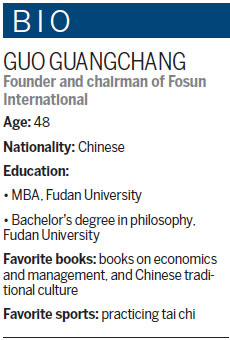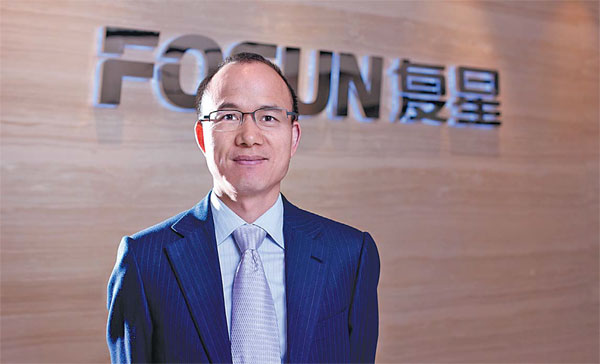It's a matter of balance
Updated: 2015-03-20 07:41
By Hu Haiyan(China Daily Europe)
|
|||||||||||
Investment company founder sees parallels between a traditional martial art and putting money in the right place
Guo Guangchang reckons that any Chinese company wanting to know how it should tackle the challenge of going abroad needs to look no further than the Chinese martial art of tai chi.
"With tai chi you need to be able to balance and to integrate," says Guo, chairman of the investment group Fosun International of Shanghai, the country's largest domestic private investment company. "And when Chinese companies develop their businesses overseas they need to be able to integrate resources from all around the world."
|
Guo Guangchang, chairman of the investment group Fosun International of Shanghai, says as China is now the second-largest economy, it is normal for Chinese companies to eye the global stage. |
Given that China is now the second-largest economy, it is normal for Chinese companies to eye for overseas markets, Guo says.
"Chinese companies need to learn more about the global economy, deal with competition in their own way and integrate with the places where they do business. They can then use the fruits of their experience at home to improve their competitive edge.
"With domestic market growth such as it is, now is the right time for Chinese companies to go abroad to develop their business. But in going global it is essential that a balance be struck between seeking opportunities and minimizing risks," says Guo, 48, wearing a smart business suit, and whose soft, lilting voice may well be the product of the tai chi he practices frequently.
"Fosun has grown through a series of strategic investments in China, and aims to tap the overseas market further," says Guo, one of the wealthiest people on the Chinese mainland, with a personal fortune that Forbes put at 26.3 billion yuan ($4.2 billion; 4 billion euros) in 2014.
Fosun International is a major private investor on the acquisition trail in Europe and the United States. One of its most eye-catching deals was its purchase in January, at 24.60 euros a share, of the French holiday resort operator Club Mediterranee SA, valuing the brand at 939 million euros.
"There are three Club Med resorts in China at present, and we expect that Club Med will set up more resorts to service its Chinese clientele," Guo says. "We also expect more Chinese travelers will stay at resorts operated by Club Med overseas."
Last year Fosun spent more than $8 billion in investments, ranging from tourism and film to the Internet, some of which were overseas.
It invested $200 million in the movie company Studio 8, making it the largest acquisition involving Chinese capital in the history of the Hollywood film industry.
Guo, a member of the 12th Chinese People's Political Consultative Conference National Committee, says that the opportunities for Chinese companies to develop their businesses overseas are numerous.
"The One Belt One Road Strategy presents opportunities, for example the strategy covering areas such as Central Asia, South Asia, Western Asia and Southeast Asia, where about 4.4 billion people live, a market worth $2.1 trillion." The strategy refers to new Silk Road initiatives to more closely link China with other countries in Asia, as well as East Africa, the Middle East and Europe.
It is crucial communications between these regions be improved and that capital be allocated effectively, he says.
"In that way many Chinese companies would be able to get more help."
China's outbound investment was worth $116 billion last year, and foreign capital investment was worth $119.6 billion, 1.7 percent higher than in the previous year, Guo says.
"But in the process of going global, Chinese companies still face challenges with a domestic approvals process that takes too long and is inefficient."
Another challenge that Chinese companies face is protectionism, he says.
"In recent years there have been many great opportunities in mergers and acquisitions, but because of constraints with financing, many domestic companies have failed to make the most of them.
"I hope the Chinese government can provide more support when private companies go global, including granting more financial backing, and the innovation of free trade zones, too."
He has several suggestions on the kind of support private companies going global can be given.
"The first would be for the government to make and enforce laws relating to overseas investment. The second would be to improve the service and support given to private companies making overseas investments. That would include developing the services of investment banks and consulting firms so more advice is given to companies about target countries' laws and regulations, culture and the investment climate."
Proper financial structures also are a must, he says.

"The multi-layered capital market can be developed further to provide more support for private companies' overseas expansion, for example by issuing more bonds."
State-owned enterprises and private companies with experience investing overseas could put their heads together to do joint investments, he says.
"Private companies could also work with SOEs to develop business. Some of the big domestic banks could join the overseas mergers and acquisitions process, and support the overseas expansion of Chinese companies."
Guo says he was born to a poor farming family in Zhejiang province, and it was only through hard work and diligence that he managed to gain admission to Fudan University in Shanghai.
In 1992, a speech by then paramount leader Deng Xiaoping during his acclaimed southern tour inspired Guo, then a graduate studying philosophy.
He then set up the company with three other Fudan graduates, with an initial funds of $4,000.
After more than 20 years' growth, Fosun has developed into an industrial conglomerate with investments in insurance, industrial operations, pharmaceuticals and asset management.
It employs more than 100,000 people worldwide and has more than $50 billion in assets, one-third of them in the insurance industry.
Guo says he is particularly interested in opportunities in Europe and the US, where he is eyeing companies in both branded goods and in technology.
"By going overseas we have the opportunity to learn from leading private equity firms, which will make us more effective both at home and in international markets."
Guo says he greatly admires billionaire US investor Warren Buffett, to whom he is sometimes compared.
"We really like the approach he takes," he says. "Fosun conducts an investment model of 'Combining China's growth momentum with global resources'. We want to become a premier global investment company.
"Fosun has ambitions to manage assets of 1 trillion yuan, most of them overseas. We go to other countries to buy companies and help them develop their businesses in China. We have an advantage over our competitors in being able to offer opportunities in the fast-growing China market for the companies we invest in.
"The Chinese market has great potential, which is also clearly an advantage for us as we look to develop business outside the country. Introducing brands overseas can also help improve the quality of domestic brands."
huhaiyan@chinadaily.com.cn
(China Daily European Weekly 03/20/2015 page32)
Today's Top News
Russia, China to uphold WWII history
Sanctions linked to Minsk deal implementation: EU
Australia to invest A$3b in AIIB
Germany insists Greece must stick to bailout agreement
Manhunt launched for accomplices in Tunisian museum attack
Chanel to reduce prices in China
Russian FM slams Kiev for turning Minsk agreements 'upside down'
European chamber calls on China to boost reforms
Hot Topics
Lunar probe , China growth forecasts, Emission rules get tougher, China seen through 'colored lens', International board,
Editor's Picks

|

|

|

|

|

|






